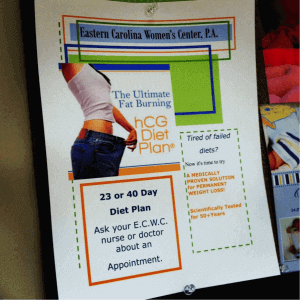4 Reasons I Don’t Support the hCG Diet
Just the other day, one of our Bikini Boot Campers posted on Facebook that she was watching an afternoon talk show and the topic was hormones. Suzanne Somers and a personal trainer on the show fielded a question about a diet of 500 calories/day. Our Bikini Boot Camper posted: “What? Are you kidding me? They are in serious need of Bikini Bootcamp and changing their lifestyle!”
And she’s right.
Unfortunately, drastically low calorie diets, like the hCG diet, are becoming all too common. From magazines to infomercials to DOCTOR’S OFFICES, these “quick fixes” gain promotion with no thought given to the sustainability or metabolic consequences for their followers.

This post is in no way meant to be offensive, but rather to provide helpful information as you make an informed decisions about what’s best for YOU and YOUR body. Our mission is to give you the tools you need to reach your goals, create lasting body change, and live the fat loss lifestyle. Our passion is to promote optimal health for EVERY woman.
4 Reasons I Don’t Support the hCG Diet
1) It’s a low calorie diet with a medical mask.
The flyers like to flaunt that the hCG diet is “scientifically tested for 50+ years.” While that may be true, don’t let them deceive you into thinking it’s fancier than what it really is. Ultimately the hCG diet is nothing more than a very expensive (average $400-$800 for 32 days), very low calorie diet (500 or less calories daily), directed by a physician. Yes, it has been studied for quite some time. But research has come to the conclusion that any success on the hCG diet plan has to do with the low calorie intake and NOT anything to do with the hCG itself. In fact, most studies conclude that there is no rationale for the use of hCG injections in the treatment of obesity, whatsoever.
Another interesting study:
- The Study: One research study was designed to retest the hCG diet on weight loss in obese women by duplicating a similar study done in 1973. The goal was to determine if the combination of 500 calorie diet and hCG had any statistically significant benefit over the diet and placebo combination. Researchers looked for evidence of greater weight loss and decreased hunger. They tested fifty-one women between the ages of 18 and 60 in this 32-day prospective, randomized, double-blind comparison of hCG versus placebo. Each patient was given the same diet (the one prescribed in the 1973 study). They were weighed daily Monday through Saturday and counseled by one of the investigators who administered the injections. Laboratory studies were performed at the time of initial physical examinations and at the end of the study.
- The Results: There was no statistically significant difference in the means of the two groups weight loss, percent of weight loss, hip and waist circumference, weight loss per injections, or hunger ratings.
- The Conclusion: HCG does not appear to enhance the effectiveness of a rigidly imposed regimen for weight reduction.
2) The hCG Diet promotes weight loss not fat loss.
The flyer in my doctor’s office boasts: “hCG is a medically proven solution for permanent weight loss.” I guess, technically, that’s true. If you follow such a low calorie diet, you will most likely experience rapid weight loss. But the problem is that weight loss and fat loss are not the same thing. You may lose weight while following the hCG diet, but a majority of that weight loss will be a loss of muscle rather than fat. Ultimately, by decreasing your muscle mass, you decrease your metabolism. Additionally, you set yourself up for yet another yo-yo of weight loss/gain. Our bodies gain fat far more easily than they gain muscle. So the real tragedy of crash diet yo-yo-ing is that most dieters end up fatter in the end than they were before the diet!
3) The hCG Diet promises a quick fix…that doesn’t exist.
Our culture is constantly looking for a quick fix. We have an instant gratification mindset of “I want it now.” In addition to wanting it now, we also want it with as little effort as possible. Yes, it’s nice to see rapid results (which you most certainly get if you’re starving yourself on only 500 calories a day). But in my experience, patience and practice are worth much more in the long run. Drastically decreasing calories will eventually do significant damage to your metabolic hormone balance. Making this quick fix the culprit for greater problems in the future.
4) The hCG Diet is not a lifestyle.
Ultimately, I don’t believe the hCG diet encourages or teaches a proper fat loss lifestyle. In fact, I believe it does the opposite. Yes, you’ll lose weight (muscle, not fat) while following the diet, but the weight you lose will not be permanent. It must be accompanied by a mindset change and a change in emotional and behavioral habits.
True and sustainable body change requires that we change habits and create a new lifestyle. In my opinion, no one will be able to make the HcG diet a lifestyle. It’s expensive. Furthermore, I don’t think you’re going to get hormone injections (or use the nasal spray or take the drops) long-term. The diet will inevitably create imbalanced metabolic hormones and uncontrollable hunger, low energy and a lot of cravings. So it’s only a matter of time before willpower keeps you from following a program with such a severe caloric restriction.
Adherence is key to results. Women need to learn how to change their lifestyles permanently in order to maintain weight loss on this (or any other) weight loss program. Ask yourself, “Is this something I could do for the rest of my life?” If not, it’s not going to work.
It is possible, with a lifestyle change, to successfully use an ultra-low calorie diet for fat loss. However, it is my opinion that the hCG diet is not likely to produce the sustainable body change you want.
Maybe you’ve tried the latest fad diet, eliminated entire food groups, counted points, followed meal plans, or any of a thousand other “solutions.” And maybe you got results for a little while. But the truth is that over 90% of women who lose weight regain it- and sometimes more. In addition, most diets leave women feeling frustrated, guilty, and even more focused on food than ever before.
It’s time that we change unproductive behaviors and ditch the diet once and for all. Find Food Freedom with BeyondFit’s 21 Day Food Freedom Challenge!
